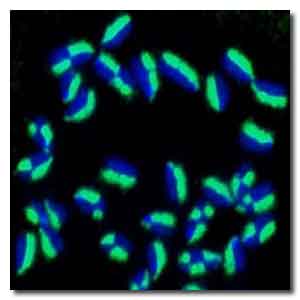|
Scientists have shown how alcohol damages DNA in
stem cells, which may help to explain how drinking
alcohol is linked to an increased risk of cancer,
according to research led by scientists from the MRC
Laboratory of Molecular Biology and part-funded by
Cancer Research UK.

Scrambled chromosomes after exposure of mice
to ethanol. Credit: J. Garaycoechea, MRC LMB
Much previous research looking at the precise ways
in which alcohol causes cancer has been done in cell
cultures.
But in this study, published in Nature researchers
used mice to show how alcohol exposure leads to
permanent genetic damage.
The scientists gave diluted alcohol, chemically
known as ethanol, to mice.
They then used chromosome analysis and DNA
sequencing to examine the genetic damage caused by
acetaldehyde, a harmful chemical produced when the
body processes alcohol.
They found that acetaldehyde can break and damage
DNA within blood stem cells leading to rearranged
chromosomes and permanently altering the DNA
sequences within these cells.
It is important to understand how the DNA blueprint
within stem cells is damaged, because when healthy
stem cells become faulty they can give rise to
cancer.
Professor Ketan Patel lead author of the study and
scientist, part-funded by Cancer Research UK, at the
MRC Laboratory of Molecular Biology, said: “Some
cancers develop due to DNA damage in stem cells.
While some damage occurs by chance, our findings
suggest that drinking alcohol can increase the risk
of this damage.”
The study also examined how the body tries to
protect itself against damage caused by alcohol.
The first line of defence is a family of enzymes
called aldehyde dehydrogenases (ALDH).
These enzymes break down harmful acetaldehyde into
acetate, which our cells can use as a source of
energy.
Worldwide, millions of people, particularly those
from South East Asia, either lack these enzymes or
carry faulty versions of them.
So, when they drink, acetaldehyde builds up which
causes a flushed complexion, and also leads to them
feeling unwell.
In the study, when mice lacking the critical ALDH
enzyme - ALDH2 - were given alcohol, it resulted in
four times as much DNA damage in their cells
compared to mice with the fully functioning ALDH2
enzyme.
The second line of defence used by cells is a
variety of DNA repair systems which, most of the
time, allow them to fix and reverse different types
of DNA damage.
But they do not always work and some people carry
mutations which mean their cells are not able to
carry out these repairs effectively.
Professor Patel added: “Our study highlights that
not being able to process alcohol effectively can
lead to an even higher risk of alcohol-related DNA
damage and therefore certain cancers.
But it’s important to remember that alcohol
clearance and DNA repair systems are not perfect and
alcohol can still cause cancer in different ways,
even in people whose defence mechanisms are intact.”
The study tested blood stem cells because properties
of these cells enabled the scientists to demonstrate
how the DNA within individual cells was damaged.
They did this by grafting single blood stem cells
from mice exposed to alcohol into recipient mice,
where the cells multiplied and could then be
submitted to whole genome sequencing.
This research was funded by Cancer Research UK,
Wellcome and the MRC.
For more information
Nature
Alcohol and endogenous aldehydes damage chromosomes
and mutate stem cells
Link...
Source:
UK Medical Research Council
Link...
MDN |